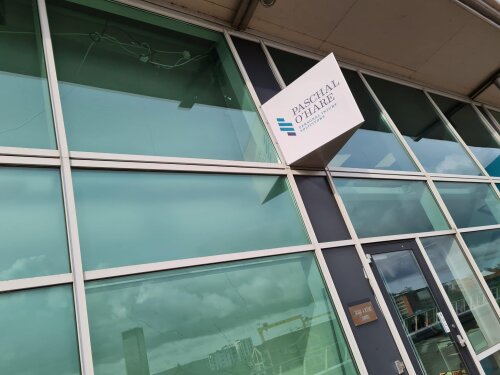Best Brain Injury Lawyers in Belfast
Share your needs with us, get contacted by law firms.
Free. Takes 2 min.
List of the best lawyers in Belfast, United Kingdom
About Brain Injury Law in Belfast, United Kingdom
Brain injury law covers legal issues that arise when someone suffers damage to their brain because of an accident, medical treatment, an assault, or other causes. In Belfast, which is part of Northern Ireland, people with acquired brain injury or traumatic brain injury may seek compensation, rehabilitation funding, or social support through civil claims, criminal injuries schemes, benefits, and healthcare routes. Brain injury cases are often complex because the effects can be long-term and wide-ranging - affecting memory, cognition, mood, communication, mobility, and the ability to work or live independently. Legal work in this area focuses on securing compensation for past and future care, rehabilitation, lost earnings, and loss of quality of life, while coordinating with medical and rehabilitation professionals to support recovery.
Why You May Need a Lawyer
Brain injury claims commonly involve technical medical evidence, long-term cost projections, and negotiation with insurers or public bodies. You may need a lawyer if:
- The injury was caused by someone else through negligence - for example a road traffic accident, workplace accident, or a fall due to unsafe premises.
- You believe the injury resulted from clinical negligence - for example a misdiagnosis, delayed treatment, or an error during medical care within Health and Social Care services.
- The injury was caused by a criminal act - and you need help with both criminal injuries compensation and a civil claim for additional losses.
- You or the injured person lacks capacity to manage legal or financial affairs and you need to apply for deputyship or other protective orders.
- The case involves complex, ongoing care needs, future loss of earnings and rehabilitation funding that require expert assessment and drafting of long-term care plans.
A specialist solicitor can assess liability, gather medical and rehabilitation evidence, value future needs, pursue funding for rehabilitation, negotiate structured settlements, and represent you in court if needed.
Local Laws Overview
Several legal frameworks and practical routes are particularly relevant in Belfast and Northern Ireland:
- Time limits for personal injury claims - In Northern Ireland there is generally a three year limitation period for personal injury claims. The time usually runs from the date of the injury or from the date the injured person knew, or ought to have known, that the injury was connected to another partys negligence. There are special rules for children and for people who lack mental capacity.
- Clinical negligence - Claims against hospital trusts, GPs or other health providers in Northern Ireland typically require medical records, specialised medical expert reports, and compliance with pre-action procedures. Health and Social Care Trusts are commonly involved and cases can take time because of the need to obtain and review detailed clinical evidence.
- Employer and workplace claims - Employers have duties under health and safety legislation to provide a safe system of work. If a brain injury arises from a breach of those duties, a claim in negligence and for loss of earnings may follow. Industrial injury benefits or other statutory compensation schemes may also be relevant and run alongside civil claims.
- Road traffic claims - If a driver or other road user caused the injury, the insurers of the negligent party will usually be involved. Road traffic claims in Northern Ireland follow similar principles to other UK jurisdictions but are dealt with through local courts and insurance procedures.
- Criminal injury compensation - If the brain injury was caused by a violent criminal act, you may be eligible to apply to the Criminal Injuries Compensation Scheme as well as pursue a civil claim. The criminal injuries route is a separate, statutory scheme with its own criteria and timescales.
- Capacity and court protection - Where the injured person lacks mental capacity, it can be necessary to obtain deputyship or court orders to manage compensation funds, to approve settlements, or to make decisions about ongoing care and housing. Solicitors experienced in brain injury cases can advise on applying to the court for authority to act on the persons behalf.
Frequently Asked Questions
What counts as a brain injury in legal terms?
Legally, brain injury includes traumatic brain injury caused by external force, and acquired brain injury from events such as strokes, infections, or lack of oxygen. The key is demonstrable damage to brain structure or function leading to identifiable symptoms and impairment that can be evidenced by medical reports.
How long do I have to bring a claim in Belfast?
There is usually a three year time limit for personal injury claims in Northern Ireland. The clock starts at the date of injury or from the date you knew, or should have known, the injury was connected to someone els negligence. Different rules apply for children and for people who lack capacity, so you should get legal advice promptly.
Do I need a specialist solicitor for a brain injury case?
Yes. Brain injury claims are medically and legally complex. A specialist solicitor will know how to obtain and present medical and neuropsychological evidence, instruct rehabilitation experts, value future care and loss, and secure funding arrangements such as structured settlements.
What kind of evidence will I need to support a claim?
Core evidence includes contemporaneous medical records, hospital notes, imaging reports, expert medical and neuropsychological opinions, witness statements, employment and wage records, details of care and support needs, and evidence of rehabilitation and future care costs.
Can I claim if the injury happened at work?
Yes. If an employers breach of duty caused the injury, you may bring an employers liability claim. You may also be able to access workplace benefits or industrial injury benefits. Your solicitor can advise whether civil claims or statutory benefits are appropriate and how they interact.
What if the injury happened because of medical treatment?
If negligent medical treatment caused the brain injury, you may have a clinical negligence claim against the treating trust or practitioner. Clinical negligence claims require expert medical evidence showing a breach of the accepted standard of care that caused the injury and resulting losses.
What compensation can I expect for a brain injury?
Compensation is case specific. Typical heads of damage include general damages for pain and suffering, special damages for past financial losses, future loss of earnings, costs of care and rehabilitation, equipment and home adaptations, and expenses for specialist therapies. Settlements often include provision for long-term and changing needs.
Will I have to go to court?
Many cases settle without a trial after negotiation and disclosure of expert reports. However, some cases do proceed to court if liability or quantum cannot be agreed. Your solicitor will prepare you for any court process and try to resolve matters by negotiation or alternative dispute resolution when appropriate.
What if the injured person lacks mental capacity?
If a person lacks capacity to bring or manage a claim, a relative or friend can seek legal authority to act on their behalf, for example by applying to the court for deputyship. Solicitors experienced in brain injury can guide you through protecting the persons interests and applying for court approval of settlements.
How are legal fees handled - will I be able to afford a solicitor?
Many specialist solicitors offer conditional fee arrangements - sometimes called no win no fee - or other funding options. The availability of funding varies by firm and case type. Solicitors must give clear information about likely costs, success fees, and any deductions from compensation. Ask about funding and fee agreements at an early meeting.
Additional Resources
Helpful organisations and bodies for people in Belfast and Northern Ireland include:
- Headway Northern Ireland - an organisation supporting people with brain injury and their families.
- Law Society of Northern Ireland - for finding regulated solicitors specialising in personal injury and clinical negligence.
- Citizens Advice Northern Ireland - for general legal information and guidance about benefits.
- Department for Communities - for information on social security benefits and industrial injuries benefits.
- Public Health Agency and Health and Social Care Trusts - for local rehabilitation and support services.
- Criminal Injuries Compensation Scheme administrators - for information on state compensation after violent crime.
- Equality Commission for Northern Ireland - for advice about discrimination and access to services.
- Local rehabilitation providers and neuropsychology services - for assessment and therapy recommendations as part of a claim.
Next Steps
If you or a loved one has suffered a brain injury in Belfast and you think you may need legal help, consider the following practical steps:
- Seek prompt medical attention and ensure all treatment and rehabilitation is recorded in the medical record.
- Preserve evidence - keep photographs, witness details, accident reports, payslips, receipts for expenses, and any correspondence with insurers or employers.
- Report the incident where appropriate - for example to the employer, the police if a crime was involved, or to the relevant premises owner.
- Contact a solicitor who specialises in brain injury, personal injury or clinical negligence. Arrange an initial consultation to discuss liability, likely timescales, evidence needed, and funding options.
- Start rehabilitation and obtain assessments - early rehabilitation evidence can be crucial to both recovery and establishing future needs in a claim.
- Act promptly because limitation periods can expire. Even if you are unsure about a claim, an early legal discussion will ensure deadlines are not missed and that you have a clear plan to protect the injured persons interests.
Specialist legal help can make a significant difference to recovery, access to services, and long-term financial security. If in doubt, seek a professional assessment of your situation without delay.
Lawzana helps you find the best lawyers and law firms in Belfast through a curated and pre-screened list of qualified legal professionals. Our platform offers rankings and detailed profiles of attorneys and law firms, allowing you to compare based on practice areas, including Brain Injury, experience, and client feedback.
Each profile includes a description of the firm's areas of practice, client reviews, team members and partners, year of establishment, spoken languages, office locations, contact information, social media presence, and any published articles or resources. Most firms on our platform speak English and are experienced in both local and international legal matters.
Get a quote from top-rated law firms in Belfast, United Kingdom — quickly, securely, and without unnecessary hassle.
Disclaimer:
The information provided on this page is for general informational purposes only and does not constitute legal advice. While we strive to ensure the accuracy and relevance of the content, legal information may change over time, and interpretations of the law can vary. You should always consult with a qualified legal professional for advice specific to your situation.
We disclaim all liability for actions taken or not taken based on the content of this page. If you believe any information is incorrect or outdated, please contact us, and we will review and update it where appropriate.














